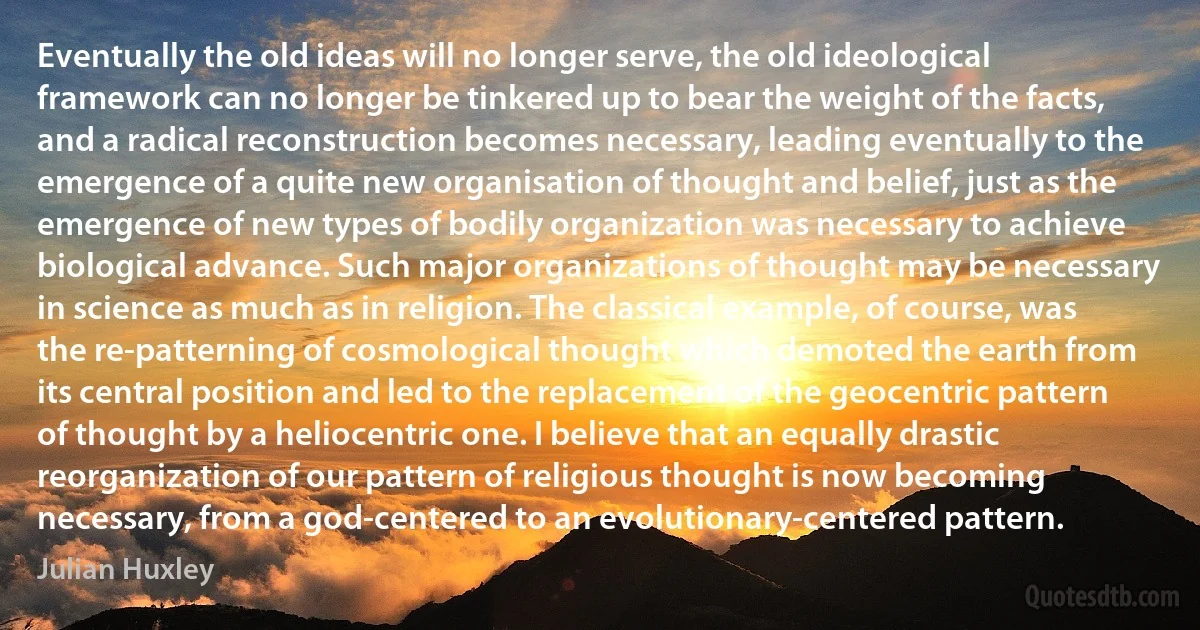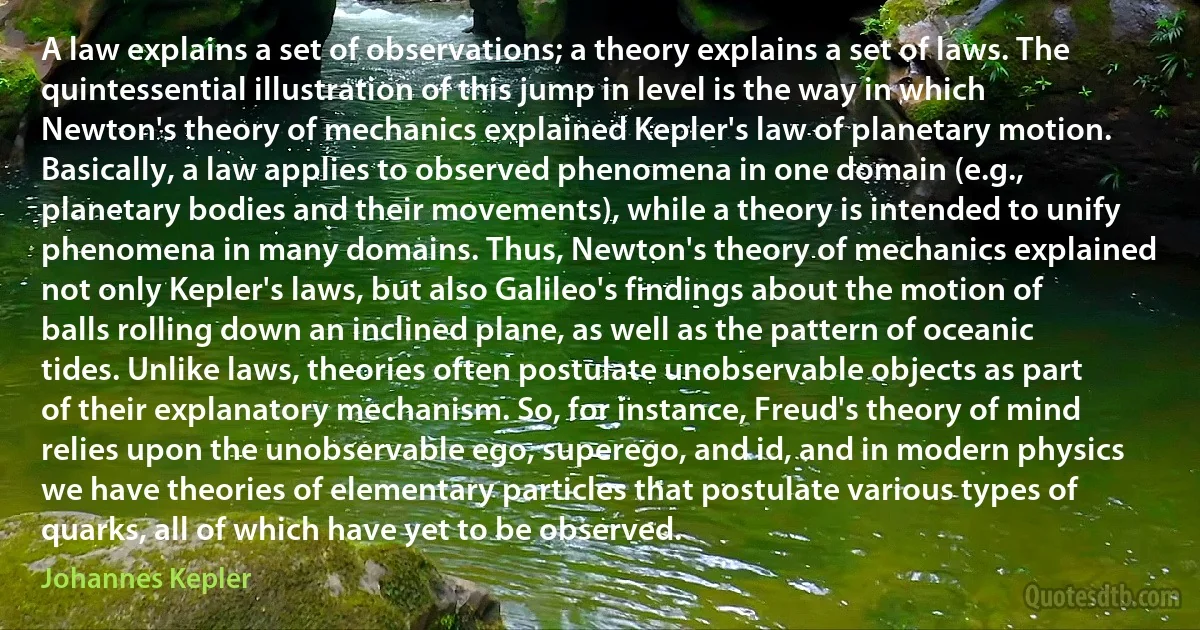Pattern Quotes - page 28
New truths... are hovering on the horizon of the human mind. The ground is being prepared for the sowing of this seed, and the stage set for the emergence of new Actors in the great drama... Certain great concepts are firmly grasped by man. Certain great hopes are taking form and will become the pattern of man's living. Certain great speculations will become experimental theories, and later prove demonstrated facts . . . A great stirring and moving is going on. The world of men is seething in response to the inflow of spiritual energy. This energy has been evoked by the unrealised and inaudible cry of humanity itself. Humanity has become - for the first time in its history - spiritually invocative. p. 77/8.

Alice Bailey
In essence, this is the vegetarian (or, as one cult calls itself, a fruitarian) creed, but it has had remarkably little success. The urge to eat meat appears to have become too deep-seated. Given the opportunity to devour flesh, we are loth to relinquish the pattern. In this connection, it is significant that vegetarians seldom explain their chosen diet simply by stating that they prefer it to any other. On the contrary, they construct an elaborate justification for it involving all kinds of medical inaccuracies and philosophical inconsistencies.

Desmond Morris
"You will understand,” said the Weaponeer, "that a pattern for events exists. It is the function of such as myself to shape events so that they will fit the pattern.” He bent, with a graceful sweep of arm, and seized a small jagged pebble. "Just as I can grind this bit of rock to fit a round aperture.”
Kergan Banbeck reached forward, took the pebble, tossed it high over the tumbled boulders. "That bit of rock you shall never shape to fit a round hole.”
The Weaponeer shook his head in mild deprecation. "There is always more rock.”
"And there are always more holes,” declared Kergan Banbeck.

Jack Vance
Lunacy!
But it had not been lunacy to Emma and Scott. They thought differently. They used x logic. Those notes Emma had made on the page - she'd translated Carroll's words into symbols both she and Scott could understand.
The random factor had made sense to the children. They had fulfilled the conditions of the time-space equation. And the mome raths outgrabe -
Paradine made a rather ghastly little sound, deep in his throat. He looked at the crazy pattern on the carpet. If he could follow it, as the kids had done - but he couldn't. The pattern was senseless. The random factor defeated him. He was conditioned to Euclid.
Even if he went insane, he still couldn't do it. It would be the wrong kind of lunacy.

Lewis Padgett
I see Christ as the incarnation of the piper who is calling us. He dances that shape and pattern which is at the heart of our reality. By Christ I mean not only Jesus; in other times and places, other planets, there may be other Lords of the Dance. But Jesus is the one I know of first and best. I sing of the dancing pattern in the life and words of Jesus.
Whether Jesus ever leaped in Galilee to the rhythm of a pipe or drum I do not know. We are told that David danced (and as an act of worship too), so it is not impossible. The fact that many Christians have regarded dancing as a bit ungodly (in a church, at any rate) does not mean that Jesus did. The Shakers didn't...

Sydney Carter
Contrary to popular belief there is no reason whatever to suppose that the remuneration of labour in general has been raised by the combination of labour through the trade unions to a higher level than it would have stood at otherwise. The rising standard of living of the employed population is due to many causes; but restrictive practices are not among them. No doubt in individual occupations combination has from time to time succeeded in raising real wages above what they would have been in its absence; but any such gain, which is invariably at the expense of workers in other employments and of the general public, is always temporary and usually brief. After more or less inconvenience and, in recent times, by dint of more or less inflation, the pattern of real wages reverts to one which corresponds with the balance of supply and demand for labour in the various employments in different parts of the country.

Enoch Powell
If I were not an atheist, I would believe in a God who would choose to save people on the basis of the totality of their lives and not the pattern of their words. I think he would prefer an honest and righteous atheist to a TV preacher whose every word is God, God, God, and whose every deed is foul, foul, foul.
I would also want a God who would not allow a Hell. Infinite torture can only be a punishment for infinite evil, and I don't believe that infinite evil can be said to exist even in the case of Hitler. Besides, if most human governments are civilized enough to try to eliminate torture and outlaw cruel and unusual punishments, can we expect anything less of an all-merciful God?
I feel that if there were an afterlife, punishment for evil would be reasonable and of a fixed term. And I feel that the longest and worst punishment should be reserved for those who slandered God by inventing Hell.

Isaac Asimov
Perhaps history this century, thought Eigenvalue, is rippled with gathers in its fabric such that if we are situated, as Stencil seemed to be, at the bottom of a fold, it's impossible to determine warp, woof, or pattern anywhere else. By virtue, however, of existing in one gather it is assumed there are others, compartmented off into sinuous cycles each of which had come to assume greater importance than the weave itself and destroy any continuity. Thus it is that we are charmed by the funny-looking automobiles of the '30's, the curious fashions of the '20's, the particular moral habits of our grandparents. We produce and attend musical comedies about them and are conned into a false memory, a phony nostalgia about what they were. We are accordingly lost to any sense of continuous tradition. Perhaps if we lived on a crest, things would be different. We could at least see.

Thomas Pynchon
"...Let us go," we said, "into the Sea of Cortez, realizing that we become forever a part of it; that our rubber boots slogging through a flat of eel-grass, that the rocks we turn over in a tide pool, make us truly and permanently a factor in the ecology of the region. We shall take something away from it, but we shall leave something too." And if we seem a small factor in a huge pattern, nevertheless it is of relative importance. We take a tiny colony of soft corals from a rock in a little water world. And that isn't terribly important to the tide pool. Fifty miles away the Japanese shrimp boats are dredging with overlapping scoops, bringing up tons of shrimps, rapidly destroying the species so that it may never come back, and with the species destroying the ecological balance of the whole region. That isn't very important in the world. And thousands of miles away the great bombs are falling and the stars are not moved thereby. None of it is important or all of it is.

John Steinbeck
And so for the remaining two hours of the meeting, Mr. Delgado and I sat in the front and directed the discussion. Or rather he directed it and I pretended I had an equal voice. A pattern quickly emerged in which my words would be greeted by silence and chilly looks; then Mr. Delgado would rephrase what I had said, as if interpreting from female to male language, with the added weight of an American accent.

Andrea Lewis (writer)
In the new pattern of thought we do not assume any longer the detached observer, occurring in the idealizations of this classical type of theory, but an observer who by his indeterminable effects creates a new situation, theoretically described as a new state of the observed system. In this way every observation is a singling out of a particular factual result, here and now, from the theoretical possibilities, therefore making obvious the discontinuous aspect of physical phenomena.
Nevertheless, there remains still in the new kind of theory an objective reality, inasmuch as these theories deny any possibility for the observer to influence the result of a measurement, once the experimental arrangement is chosen. Therefore particular qualities of an individual observer do not enter into the conceptual framework of the theory.

Wolfgang Pauli
In the far north, where humans must face the constant threat of starvation, where life is reduced to the bare essentials-it turns out that one of these essentials is art. Art seems to belong to the basic pattern of life of the Eskimo, and of the neighboring Athapaskan and Algonkian Indian bands as well.

Peter Farb
Shakespeare said: "There comes a tide in the affairs of men which, if taken at the flood, moves on to fortune.” Shakespeare was initiate. He knew all about this, and throughout his works are the answers. The aim is to recognize the window of opportunity, to be so skilled and so in the rhythm of your work, that when it opens, you are there. If there is no rhythm, you could be asleep. If you set a rhythm and never sleep - I do not mean never go to sleep in bed - but if you are not mentally asleep, and do not turn off your consciousness, if you keep your consciousness alive and aware all the time, then when the window of opportunity comes you recognize it because you are in that rhythm. If you are not in the rhythm, you could miss it. This is the importance of rhythm, which of course has nothing to do with time. It is to do with awareness, a rhythmic awareness of setting, not goals, but a pattern of action, so you are always ready, "brush in hand”.

Benjamin Creme
My specific purpose for the first wiki was to create an environment where we might link together each other's experience to discover the pattern language of programming. I had previously worked with a HyperCard stack that was set up to achieve the same kind of goal. I knew people liked to read and author in that HyperCard stack, but it was single user.

Ward Cunningham
Adam Smith was the first to perceive that we have stumbled upon methods of ordering human economic cooperation that exceed the limits of our knowledge and perception. His 'invisible hand' had perhaps better have been described as an invisible or unsurveyable pattern. We are led - for example by the pricing system in market exchange - to do things by circumstances of which we are largely unaware and which produce results that we do not intend. In our economic activities we do not know the needs which we satisfy nor the sources of the things which we get.

Adam Smith



